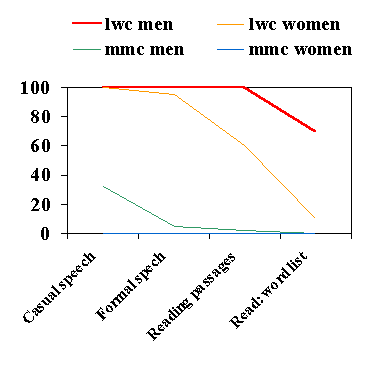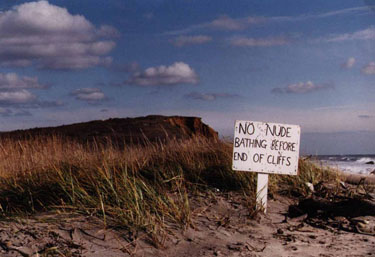EL1102 Studying English in Context
Lecture No. 4 (Part 1)
Back to EL1102 Home page
Go to Part 2
The notion of change
- How did
language become so diverse? There seems to be a tendency for language to
split up, and it is worthwhile examining the reasons for this.
- Is
language change a good thing or a bad thing?
Negative attitude to change: an irate reader
|
Dear Sirs |
- non-core
lexical items (eminent authorities rather than experts; gravitate
rather than be sympathetic to, abjectly rather than in
such a humiliating way; and so on
- ‘idiots’:
a lexical item suggesting strong value judgement
- assumptions:
there is a clear right and wrong; change is ugly
Attitudes to change: too much, too fast?
|
It’s just not on. The sloppy language of Britain’s most
articulate 18-year-olds has taken a hammering from one of Britain’s biggest
A-level examination boards … Take the A-level history student whose analysis
of Martin Luther’s excommunication by the Catholic church was direct, to say
the least. ‘Luther came in for a lot of stick,’ the candidate wrote. Or the
pupil who summed up the radical theology of John Calvin, the 16th century
Protestant reformer, with the words: ‘Calvin’s ideas were over the top’ |
Attitudes to change:
departure from ‘original’ meaning/use
|
‘I am summoned to see the headmistress at morning break
on Monday,’ said Miss Brodie. ‘I have no doubt Miss Mackay wishes to question
my methods of instruction … The word "education" comes from the
root e from ex, out, and duco, I lead. It means a leading out. To me
education is a leading out of what is already there in the pupil’s soul. To
Miss Mackay it is a putting in of something that is not there, and that is
not what I call education, I call it intrusion, from the Latin root prefix in
meaning in and the stem trudo, I thrust’ (p. 37) |
Arguments for equation:
change = degeneration
- ‘if meanings
change, how can we be sure of what anybody means?’
- ‘I took
all this trouble learning the language properly; why should these people
get away with not putting in the same effort that I have put?’
- ‘it’s so
ugly!’
Another equation: change = adaptation (evolution )
- If
people who live in the world have to constantly learn information about
the world (what new trade blocs have been formed? who’s taken over as
prime minister?), we also have to constantly ‘update’ our information
about language. So, through this process, we know that we cannot use gay
to mean carefree and happy as people did thirty years ago.
- The
first charge of imprecision we’ll probably need to take a little more
seriously. I suspect that most of the time, there is really very little ambiguity
because the context and the surrounding text usually makes the meaning
clear.
How do we cope with ambiguity?
- For
example, the word presently meant ‘currently’ up until about
Shakespeare’s time. However, in British English today, the word usually means
‘shortly’ or ‘soon’. Today, the earlier meaning has been revived. (The
earlier sense of the word has been preserved in any case in some British
and American dialects.) Appeal to the ‘original’ meaning is unavailing
because we don’t know how far back we have to go. In spite of the
contrasting meaning, during the times I have encountered the word, there
has been no ambiguity as to the meaning of the word. (Think of sentences
like: ‘I’m presently in charge of the sales division’ and ‘I’ll attend to
that presently’.) It seems to me that imprecision and ambiguity is very
often not an issue.
Change in language
- Some
suggest that language change cannot be observed. But in my own lifetime, I
am aware of changes in the language:
- pronunciation
of nephew
- use of shillings
in Singapore
- use of wireless
in Britain
Sometimes change is related to an individual’s or a community’s sense of identity. In other words, some individuals/communities (and therefore their linguistic style) might exercise some sort of attractive pull. They might be considered prestigious or proper or correct or fashionable or hip. The sociolinguists Bob le Page (University of York) and Andrée Tabouret-Keller (University of Strasbourg) talk about acts of identity in their book of the same name.

(Picture on the right: New York: United Nations building in the
foreground)
Back to New York with
Labov
- rhoticity: All accents were originally
rhotic. Non-rhotic accents began to appear in London and Boston in
the 18th century. This spread to New York too, as many immigrants were
from East Anglia.
- evidence: In 1917, linguist Edward
Sturtevant wrote: ‘A strong western r is a distinct hindrance to a man who
is trying to make his way in the East or the South of the United States.’
- change: around the time of World War II,
the prestige variety changed to a rhotic one.

- had
hunch that this variation was not random.
- observed
by many that shop assistants usually imitate the accent of their customers
- chose
three Manhattan stores which were distinguishable in terms of their
status, and the kinds of customers they attracted: Saks Fifth Avenue
(high), Macy’s (mid) and S. Klein (low)
- asked
for goods that might be found on the fourth floor
- asked
for repetition
- result:
there a higher percentage of r’s in the Saks; a higher percentage of r’s
when shop assistants were asked to repeat their response.
- concluded
that social stratification could be observed through language use in New
York.
- Centripetal
force is at work here. There is a pull towards what is considered
prestigious or ‘correct’.

(Picture on the right: Norwich castle)
Over to Norwich: Peter
Trudgill
- The
glottal stop: The glottal stop is used in some UK (and some other) accents
to replace ‘t’: better or little or a lot of it. Some
varieties of RP might have the glottal stop in words like apartment.
In some Singaporean pronunciations: pack or mat.
- Sometimes,
the change can be temporary. The British linguist Peter Trudgill noticed
that his own style of speaking changed when speaking to different
informants when he conducted face-to-face interviews with them in Norwich,
England

(Picture on the left: Norwich cathedral at night)
- Trudgill
noticed that he used more glottal stops when talking to people who also
used more glottal stops
- Conclusion:
Accommodation theory states that speakers will converge towards their
interlocutor when they wish to reduce social distance, or get on with one
another. They will diverge (ie become linguistically less similar)
when they wish to emphasise their distinctiveness or increase social
distance

Trudgill also investigated the alternation between the pronunciation
of -ing
The
standard pronunciation is -ing whereas earlier, it was -in’
When he
investigated this, internal distinctions were seen.
The men seem to be pulling one way, and the women
another
Women are more status conscious than men and want to
‘speak better’
Men admire masculinity and toughness
Martha’s Vineyard

(On the left: Map of Martha's Vineyard. Tisbury and Oak Bluffs
are in Down-Island; Gay Head is in Up-Island)
- Labov’s
experiment based on the English in Martha’s Vineyard, an island about
three miles off the east coast of mainland USA.
- permanent
local population of 6,000
- 40,000
or so visitors or ‘summer people’ who come to the island every year,
especially in the summer
- locals
mainly live in ‘Up-Island’, the western part of the island – rural and
undeveloped
- ‘summer
people’ have property in ‘Down-Island’, the north-eastern part of the
island – well developed
- interested
in the sound of the diphthongs [eI] and [aU] (as in
foul and fine), mainly the former
-
(Picture
below: Rugged landscape in Martha’s Vineyard and an interesting sign)

- devised
questions that elicited words containing the diphthongs, and he took note
of which pronunciation was produced.
- tabulated
his scores against the different age groups and found the local diphthongs
prominent in the 31–45 age group, but least in the over 75 age group.
- local
diphthongs were also more prominent in Up-Island than Down-Island.
- diphthong
was particularly prominent in a group of fishermen in Up-Island
- movement
away from the norm, and not towards the norm as in New York speech.
Hence this seems to be centrifugal, with emphasis on ‘we are different’,
rather than ‘we are like you’
Centrifugal force
- locals
disapproved of the summer people, and approved of the old fishermen.
The former epitomised indolent, consumerist values; whereas the latter
epitomised good old Yankee virtues: independence, skill, physical
strength, and courage.
- movement
is not only away from one ‘centre’, but also towards another ‘centre’.
There is the push away from one, working together with a pull towards
another one. This can be represented diagrammatically
|
|
Stabilisation: a natural change
For
example, if you build a sand castle on the beach, we expect the castle to be
disappear when the tide comes in. ‘Nature’ seems to smoothen out the
irregular landscape. The peaks are flattened and the dips are filled in. |
Example: plural system
- In PDE,
the general rule for forming plurals seems to be: ‘add -s or -es
to form a plural’. In OE:
- cwen–cwene (queens),
- scip–scipu (ships),
- hund–hundas (dogs),
- sunu–suna (sons),
- eaga-eagan (eyes), and
- word–word (words).
- complicated:
therefore unstable feature
- by
Shakespeare’s time (around 1600), the choice was reduced mainly to between
-(e)s and -(e)n, as in eyen (eyes),
shooen (shoes) and housen (houses).
- there is
a tendency to regularise irregularities: formulas v. formulae;
appendixes v. appendices – data and datas
(seldom datum); agenda and agendas (seldom agendum);
graffiti and graffitis (seldom graffito) – spaghetti
is plural in Italian, but singular in English.
- ‘irregular’
plurals descended from Old English – generally everyday words: man–men;
child–children; sheep–sheep; goose–geese. The
irregular plural of brother (brethren) is becoming
increasingly rare, even in religious contexts; the regular brothers
is now preferred.
Relevant books to read include:
- David Graddol, et al., English:
History, Diversity and Change (London: Routledge & OU, 1996)
- Jean Aitchison, Language
Change: Progress or Decay? (Cambridge: Cambridge University Press,
1991)
- Laurie Bauer, Watching English
Change (London: Longman, 1994)
Back to EL1102 Home page
© 2001 Peter Tan
